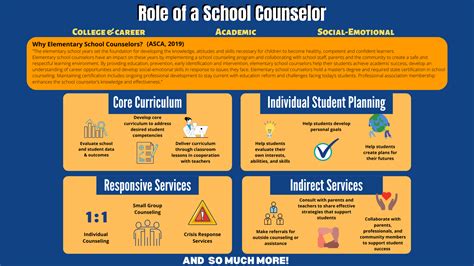As a student, navigating the complexities of school life can be overwhelming. From academic pressures to social concerns, there are times when you may need guidance and support. That’s where the school counselor comes in.

Understanding the Role of a School Counselor
School counselors are licensed mental health professionals who provide a wide range of services to students, including:
- Academic Support: Assisting with course selection, study skills, and time management.
- Personal Counseling: Offering support with emotional issues, such as anxiety, depression, and peer relationships.
- Career Planning: Guiding students in exploring their interests, setting career goals, and preparing for college or the workforce.
How to Find the School Counselor
Finding the school counselor is usually a straightforward process:
- Ask Your Teacher or School Secretary: They can provide you with the counselor’s name, office location, and contact information.
- Look for the Counselor’s Office: Most school counselors have designated offices in the school building. Check the school directory or ask around.
- Check the School Website: Many schools list the counselor’s contact information on their website.
Reaching Out to the School Counselor
Once you have found the school counselor, there are several ways to reach out:
- Schedule an Appointment: Most counselors offer scheduled appointments. You can call or email the counselor to book a time.
- Walk-In Hours: Some counselors have walk-in hours where students can meet with them without an appointment. Check with the counselor’s office for details.
- Email or Message: You can also send the counselor an email or message to request a meeting.
Tips for Meeting with the School Counselor
- Be prepared to talk about your concerns. Write down what you want to discuss in advance so you don’t forget anything.
- Be honest and open. The counselor can only help you if you are honest about what you are going through.
- Be respectful of the counselor’s time. Show up on time for your appointment and be mindful of how long you talk.
- Don’t be afraid to ask questions. Ask the counselor for clarification or to expand on certain topics.
Common Mistakes to Avoid
- Waiting too long to seek help: Don’t wait until a problem becomes overwhelming. Reach out to the counselor early on.
- Assuming the counselor knows everything: Provide as much information as possible, even if it seems irrelevant.
- Being closed-minded to suggestions: The counselor’s recommendations may not always align with your preferences, but be open to considering them.
FAQs
- How often can I meet with the school counselor? The frequency of your meetings will depend on your needs and the counselor’s availability.
- Is everything I say to the counselor confidential? Yes, most conversations with the school counselor are confidential, with exceptions for reporting certain types of harm or threats.
- What happens if I don’t want to talk to the school counselor? There are other resources available to students, such as teachers, administrators, or mental health professionals outside of school.
- How can I find a counselor if I don’t have a school counselor? There are many mental health services available in the community, such as therapy centers, clinics, and online platforms.
- What are the benefits of seeing a school counselor? School counseling can improve academic performance, reduce stress, enhance social skills, and promote overall well-being.
Tables
| Service | Description |
|---|---|
| Academic Support | Assisting with course selection, study skills, and time management |
| Personal Counseling | Offering support with emotional issues, such as anxiety, depression, and peer relationships |
| Career Planning | Guiding students in exploring their interests, setting career goals, and preparing for college or the workforce |
| Contact Method | Advantages | Disadvantages |
|---|---|---|
| Scheduled Appointment | Guaranteed meeting time | Limited flexibility |
| Walk-In Hours | May be more flexible | Can be limited by availability |
| Email or Message | Convenient and flexible | Not immediate response |
| Common Mistake | Consequences |
|---|---|
| Waiting too long to seek help | Can worsen the problem and increase stress |
| Assuming the counselor knows everything | May lead to misunderstandings or ineffective support |
| Being closed-minded to suggestions | Can limit the effectiveness of counseling |
| Frequently Asked Question | Answer |
|---|---|
| How often can I meet with the school counselor? | Depends on your needs and the counselor’s availability |
| Is everything I say to the counselor confidential? | Yes, with exceptions for reporting certain types of harm or threats |
| What happens if I don’t want to talk to the school counselor? | Other resources are available, such as teachers, administrators, or mental health professionals outside of school |
